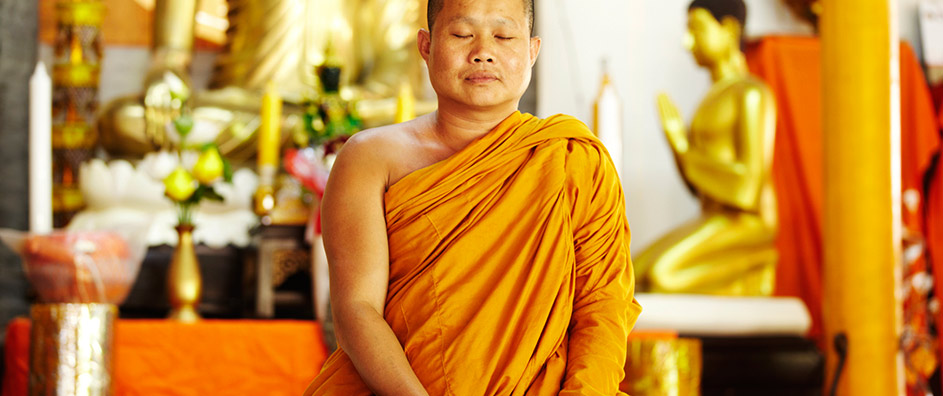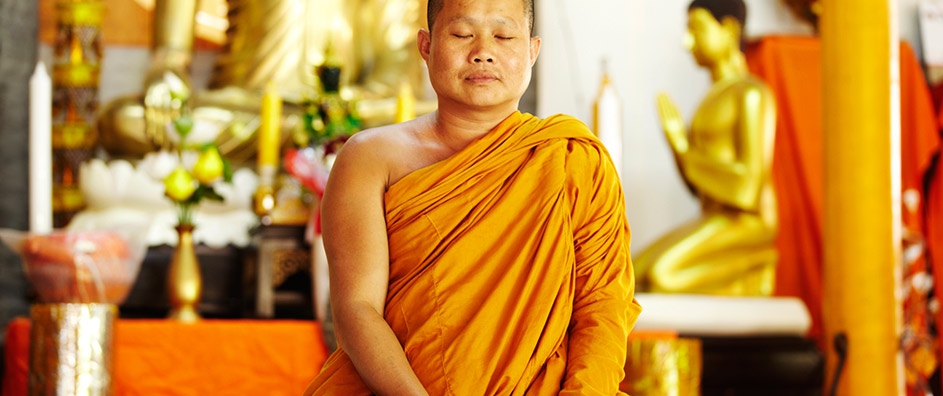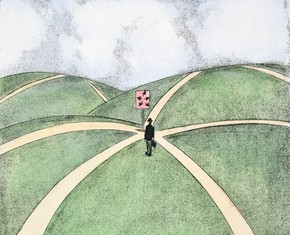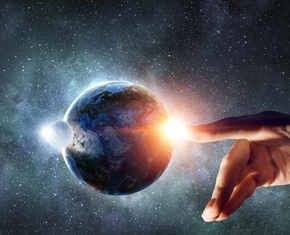The views expressed in our content reflect individual perspectives and do not represent the authoritative views of the Baha'i Faith.
 For both Buddhists and Baha’is, detachment from the material world infuses and defines their faith.
For both Buddhists and Baha’is, detachment from the material world infuses and defines their faith.
What does it mean to detach? The Baha’i teachings and the Buddhist teachings have very similar perspectives:
One who is imprisoned by desires is always unhappy; the children of the Kingdom have unchained themselves from their desires. Break all fetters and seek for spiritual joy and enlightenment; then, though you walk on this earth, you will perceive yourselves to be within the divine horizon. To man alone is this possible. When we look about us we see every other creature captive to his environment. – Abdu’l-Baha in London, p. 86.
A wise man, recognizing that the world is but an illusion, does not act as if it is real, therefore he escapes the suffering. – Buddha
We all know that the world, its illusions and desires, will fade and ultimately disappear. Seen from one point of view, life on this physical plane means a consistent pattern of loss. Each day brings us closer to our last day. Every stage of development means we lose and let go of the previous stage – infancy leads to childhood, which leads to adolescence and adulthood, which leads to the senior discount. At each juncture we lose our earlier life. Every plant and animal and human being has an arc of existence, from birth to the prime of life to a gradual physical decline and the preparation for death — and the next stage that follows it.
 Does contemplating that fate sadden you? Does the thought of death and the loss of this physical existence depress you; or maybe even make you fortify your internal denial about your eventual transition away from the material to the spiritual? Our contemporary cultures don’t encourage this sort of contemplation of the end of our material lives — so if you don’t welcome and look forward to death, you might want to think about developing some detachment.
Does contemplating that fate sadden you? Does the thought of death and the loss of this physical existence depress you; or maybe even make you fortify your internal denial about your eventual transition away from the material to the spiritual? Our contemporary cultures don’t encourage this sort of contemplation of the end of our material lives — so if you don’t welcome and look forward to death, you might want to think about developing some detachment.
How? When we’re growing up or in our physical prime, we usually don’t ponder detachment much. But as soon as the physical begins to decline, we all need to begin building a sense of detachment in our minds, hearts and souls, a realization that this material world does not last while the spiritual world is eternal:
God has given man a heart and the heart must have some attachment. We have proved that nothing is completely worthy of our heart’s devotion save reality, for all else is destined to perish. Therefore the heart is never at rest and never finds real joy and happiness until it attaches itself to the eternal. How foolish the bird that builds its nest in a tree that may perish when it could build its nest in an ever-verdant garden of paradise.
Man must attach himself to an infinite reality, so that his glory, his joy, and his progress may be infinite. Only the spirit is real; everything else is as shadow. All bodies are disintegrated in the end; only reality subsists. All physical perfections come to an end; but the divine virtues are infinite. How many kings have flourished in luxury and in a brief moment all has disappeared! Their glory and their honor are forgotten. Where are all these sovereigns now? But those who have been servants of the divine beauty are never forgotten. The result of their works is everywhere visible. – Abdu’l-Baha, Divine Philosophy, p. 135.
Every season of life, each stage of maturation, all of the milestones of our short physical existence culminate in death – which is really another birth, the Great Faiths tell us, a transition to a spiritual world. Both the Baha’i Faith and Buddhism – and all of the other major Faiths, for that matter – teach that we have eternal souls. And because our hearts and souls instinctively want to love, we need to find something to love that lasts.
That means, according to both the Baha’i and the Buddhist teachings, that attaching our emotions to anything temporal is futile and destined to fail. Expending our love and attention and resources and energies on short-term desires will ultimately only frustrate and defeat us.
Does that mean we should get rid of our possessions? No, Abdu’l-Baha advises:
Attach not thyself to anything unless in it thou seest the reality of God – this is the first step into the court of eternity. The earth life lasts but a short time, even its benefits are transitory; that which is temporary does not deserve our heart’s attachment…. Detachment does not consist in setting fire to one’s house, or becoming bankrupt or throwing one’s fortune out of the window, or even giving away all of one’s possessions. Detachment consists in refraining from letting our possessions possess us. – Abdu’l-Baha, Divine Philosophy, p. 134.
You May Also Like
Comments

















We care for ourselves because we love God. He created us and we are His property, we are not our own. Our true essence is God's and we have been commanded to share that truth with the world. We must take care of all that God has bestowed upon us, not because we worship it, but because it is a gift from our Beloved. When we begin to change how we see this world, we are able to understand how to live in it, but not be of it.